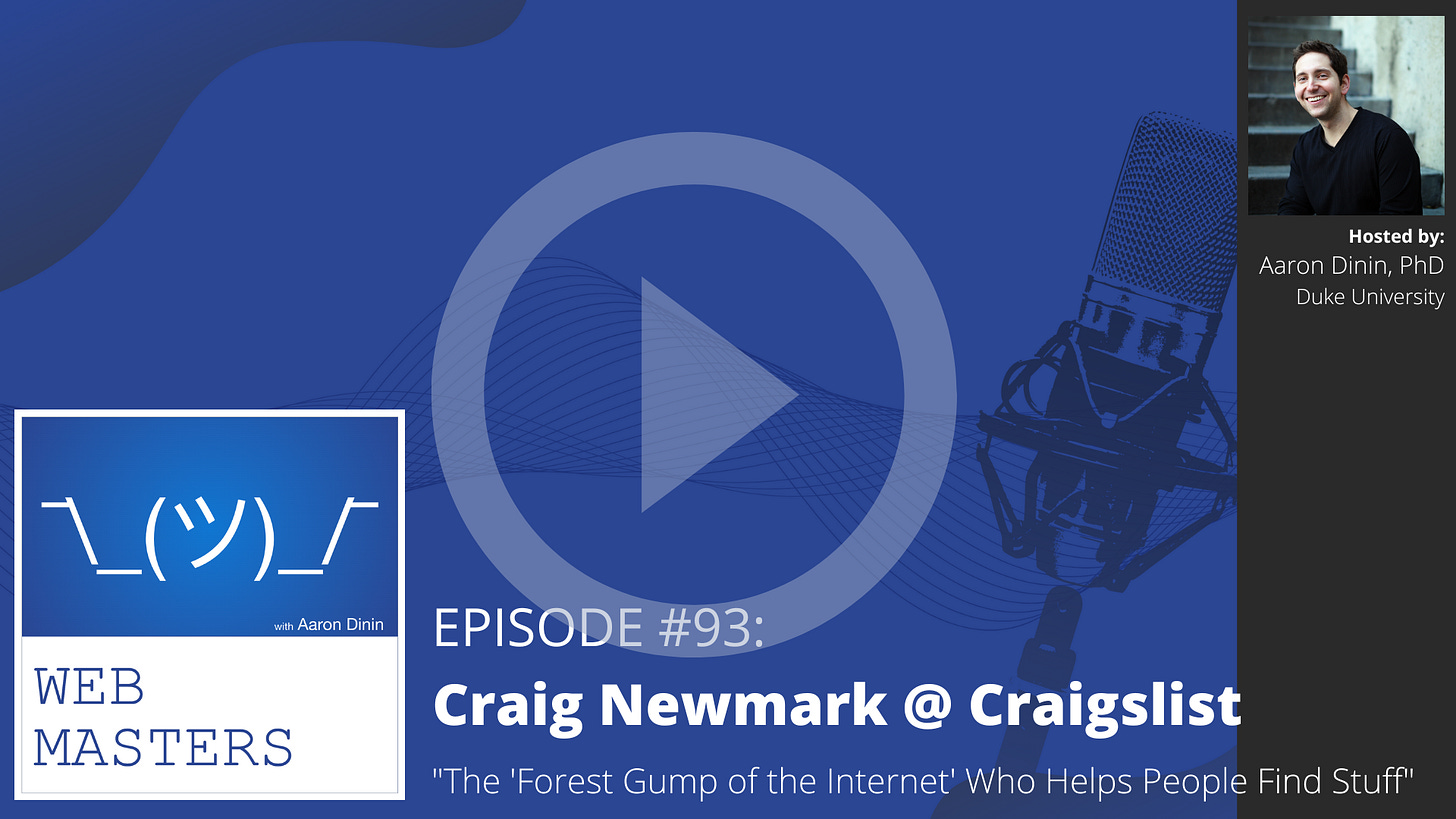Entrepreneur Office Hours - Issue #151
Talking with Craig... the dude with the big list for finding stuff
It’s bonus issue time! Why? Because I’ve got two articles and the monthly podcast. For this month’s Web Masters guest, I managed to track down Craig Newmark, founder and namesake of Craigslist. Cool, right?
I’ll admit, I was excited for the interview. After all, if it wasn’t for Craigslist, I wouldn’t have met my wife. We didn’t meet on Craigslist; however, when I was 24, I found my apartment on Craigslist. My wife was friends with one of my new neighbors, which is how I met her, so… yeah… Craig Newmark is indirectly responsible for my marriage, my kids, my move to Durham, my job teaching at Duke, and even my decision to create this newsletter.
Thanks, Craig!
I’ll admit the interview wasn’t quite what I expected. You’ll have to listen to hear why. For now I’ll just tell you he didn’t exactly follow the traditional entrepreneurial template.
Enjoy!
-Aaron
I Pretended to Be a Vlogger for a Month — Here’s What I Learned
Narrating your life to a camera will definitely get you some dirty looks, but that’s not the only thing I learned.
The “Forrest Gump of the Internet” Who Helps People Find Stuff
Is it possible to start a wildly successful company by luck? It is according to Craig Newmark, founder of Craigslist. Hear the story of how he lucked into building one of the most popular websites in the world on the new episode of Web Masters.
…or search “Web Masters” wherever you listen to your favorite podcasts.
To Be a Successful Entrepreneur, You Have to Stop Acting Like a Child
New entrepreneurs aren’t children, but they see the startup world like children, and that creates big problems.
Office Hours Q&A
———————
QUESTION:
I’m just starting a business with some friends, and everyone is telling us to negotiate our equity splits at the very beginning, before we even get started working.
How can we do that before we know how much work people are going to do, what kinds of work they’ll have, and whether or not they’re going to stick with the company?
-Alex
----------
In the beginning stages of a startup, before there’s anything real to split, the co-founders are more reasonable and friendly. This makes negotiations significantly easier
Once everyone starts working, that’s when the bickering and infighting begins. And, to be clear,, it will happen. Even if you’re building a startup with your best friends (or rather… especially if you’re building your startup with your best friends), the work is so stressful that you’ll butt heads at least occasionally.
On top of the fighting, nobody is going to feel like they’re working equally. Instead, each of you is going to feel like you’re doing more work than everyone else, which means you’re going to feel like you deserve more equity. This will create conflict in the negotiation process.
You can avoid all that conflict by splitting equity before everyone starts hating each other. More importantly, the stakes won’t be nearly as high (i.e. if you can’t come to an agreement, it won’t destroy an existing company).
As for how to prevent someone potentially leaving the company after a few months and taking a large equity stake with them, you avoid this with a simple vesting schedule and cliff.
Google “vesting schedule and cliff” for more details. The basic gist is a vesting schedule means nobody gets all their equity on Day #1. Instead, equity gets disbursed to people monthly over time (usually four years). In addition, vesting schedules usually have a one year cliff. That means nobody gets to keep their equity until they’ve been working for a year. If they decide to leave the company (or get pushed out) at three years and 364 days, they get nothing. Problem solved!
Got startup questions of your own? Reply to this email with whatever you want to know, and I’ll do my best to answer!





